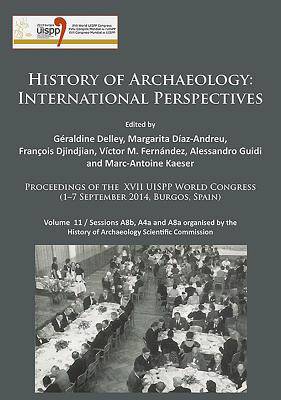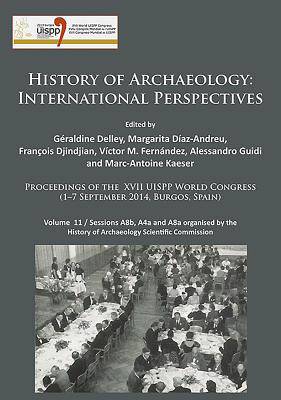
- Afhalen na 1 uur in een winkel met voorraad
- Gratis thuislevering in België vanaf € 30
- Ruim aanbod met 7 miljoen producten
- Afhalen na 1 uur in een winkel met voorraad
- Gratis thuislevering in België vanaf € 30
- Ruim aanbod met 7 miljoen producten
Zoeken
History of Archaeology
International Perspectives: Proceedings of the XVII Uispp World Congress (1-7 September 2014, Burgos, Spain). Volume 11 / Sessions A8b, A4a and A8a Organised by the History of Archaeology Scientific Commission
Paperback | Engels | Proceedings of the XVII UISPP World Congress (1–7 September 2014, Burgos, Spain)
€ 51,45
+ 102 punten
Omschrijving
The present volume gathers the communications of the three sessions organized under the auspices of the Commission 'History of Archaeology' at the XVII UISPP World Congress Burgos 2014. The first part deals precisely with 'International relations in the history of archaeology'. The eleven contributions tackle a particularly productive topic in the field today. In actual fact, this seminal research field currently echoes in a way the strong trend of scholarship about the influence of nationalism on the discipline, which since the end of the 1980s, has greatly contributed to the takeoff and overall recognition of the history of archaeology. The second part, entitled 'The Revolution of the Sixties in prehistory and protohistory', is the outcome of a partnership with the Commission 'Archaeological Methods and Theory'. The seven contributions strive to document and analyse a recent past, which is still often burdened with the weight of teleological and presentist appraisals. The inclusion in this volume of this session significantly dedicated to the genealogy of schools of thought and to the study of complex methodological and technical issues illustrates the editors' commitment to tackling historical issues as well, which are closely linked to current theoretical debates within archaeology. Such is also the aim of the third part, which addresses 'Lobbying for Archaeology'. As shown by the five contributions of this session, archaeology has not only been instrumentalised by political powers and ideological interests. It has also found fruitful alliances with economic agents or bodies, where mutual advantages were gained on practical, technical bases. This volume suggests a reflexive, critical approach to these various forms of lobbying should ensure a useful awareness regarding the structural problems archaeology faces today, regarding its funding methods.
Specificaties
Betrokkenen
- Uitgeverij:
Inhoud
- Aantal bladzijden:
- 246
- Taal:
- Engels
- Reeks:
Eigenschappen
- Productcode (EAN):
- 9781784913977
- Verschijningsdatum:
- 23/06/2016
- Uitvoering:
- Paperback
- Formaat:
- Trade paperback (VS)
- Afmetingen:
- 211 mm x 295 mm
- Gewicht:
- 861 g

Alleen bij Standaard Boekhandel
+ 102 punten op je klantenkaart van Standaard Boekhandel
Beoordelingen
We publiceren alleen reviews die voldoen aan de voorwaarden voor reviews. Bekijk onze voorwaarden voor reviews.










